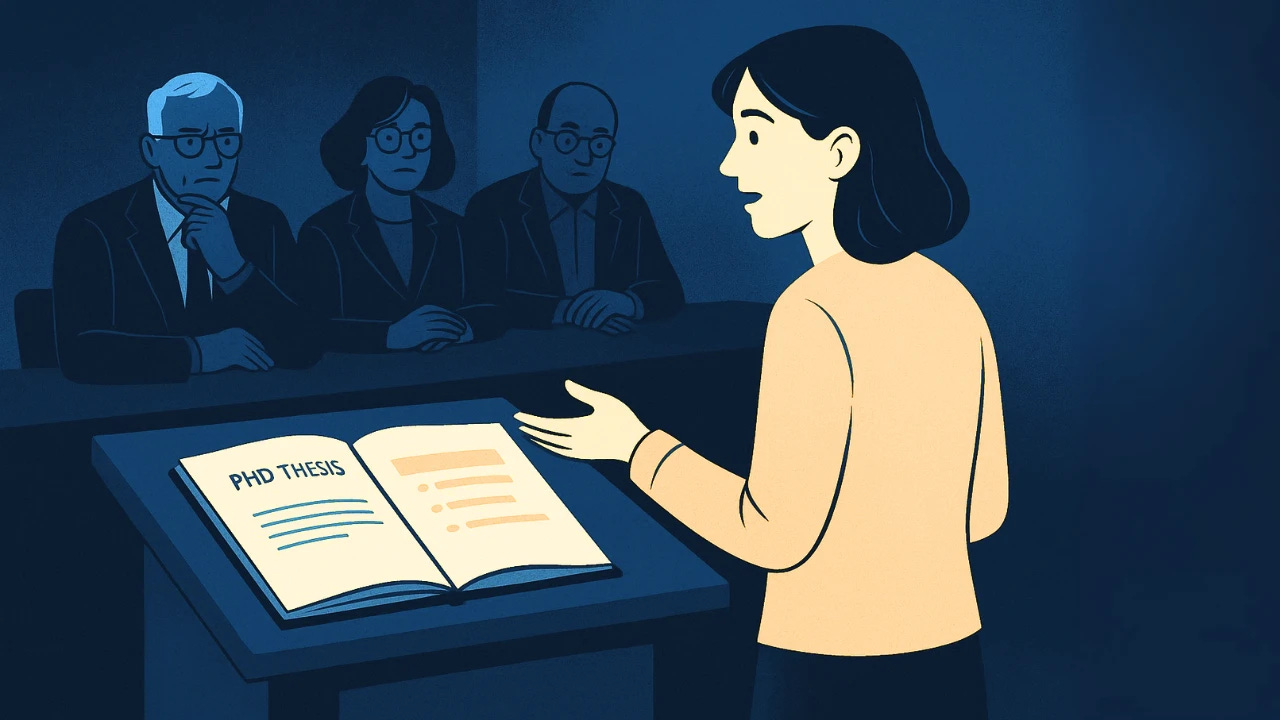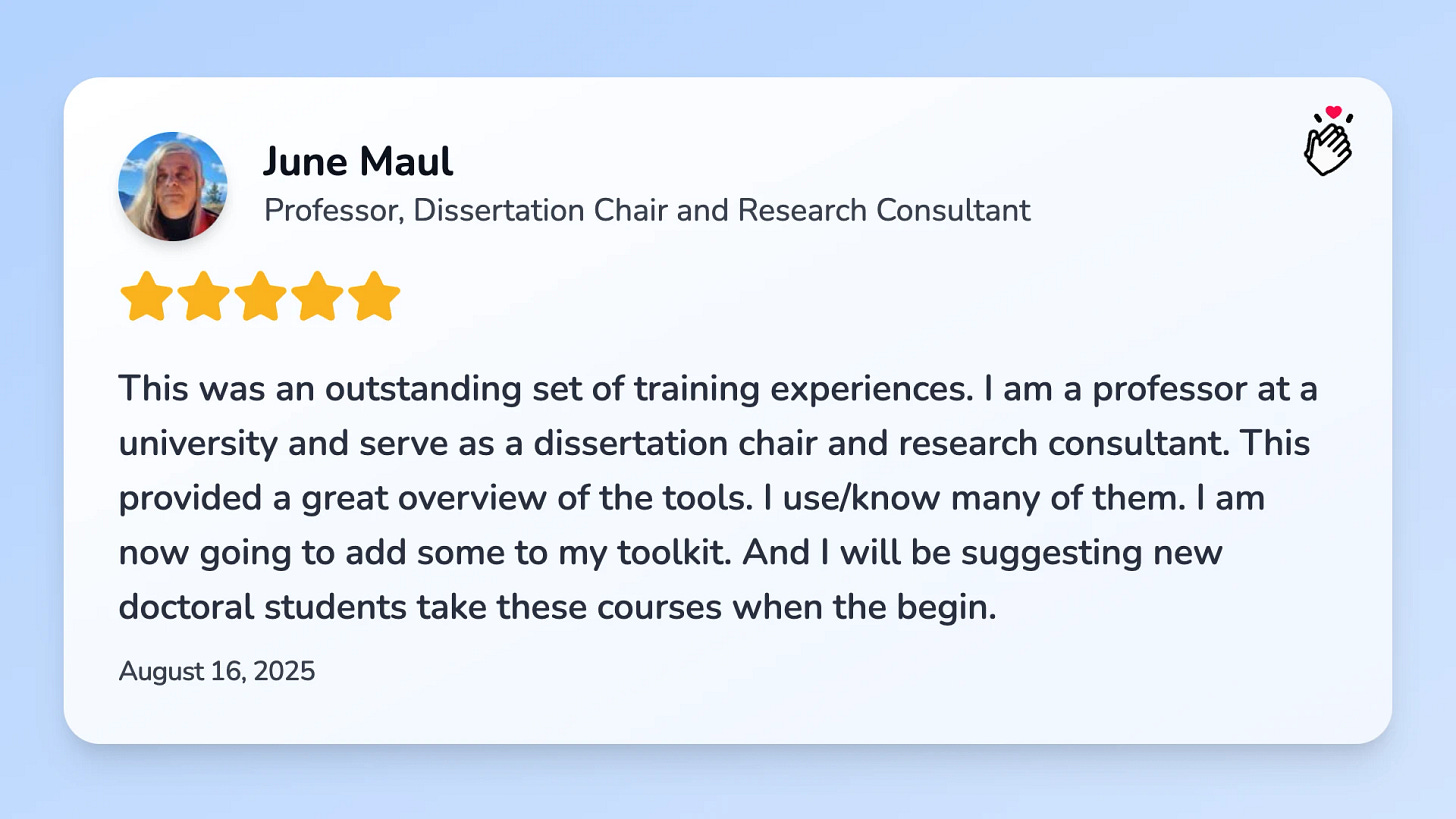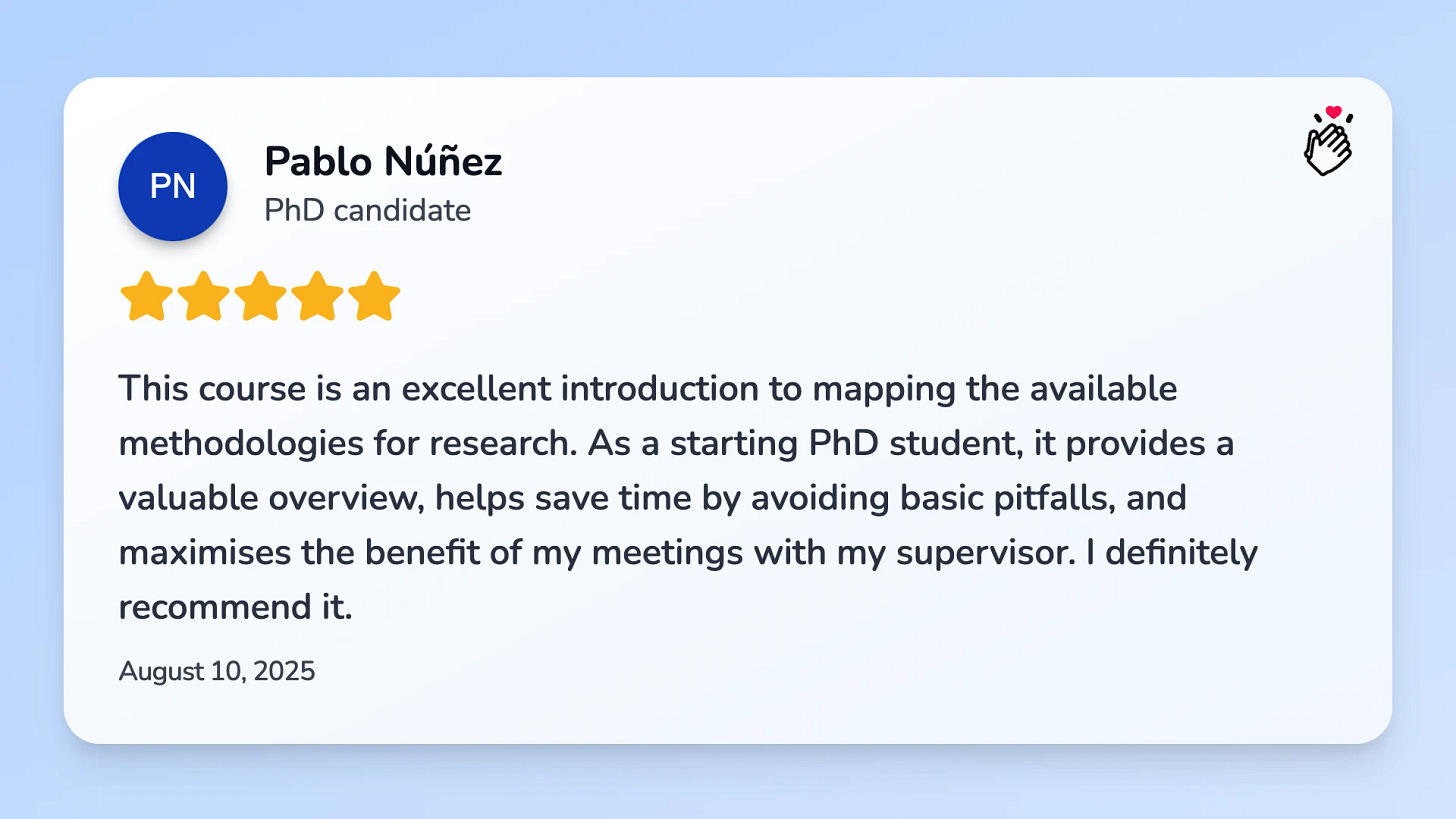6 Ways I Turn Thesis Flaws into Power Moves
Most PhD candidates try to hide weaknesses, but I’ve coached dozens to use them as weapons
Two things are approaching at a rapid speed as we are closing off the summer months at the university: My sabbatical is now only two weeks away, and I’m really thrilled to go all in on the business and my upcoming books. The annual deadline for the most important conference in my field (CHI) is also inching closer, and we are going deep into a writing crunch with my research group to get the papers that we’ve planned for this year’s submission ready. On Monday, we spent more than two hours going round-robin on the abstracts that we already have drafted, and we generated a lot of great feedback in the group. I’m really proud of my team. Lots of hard work coming together.
As I’m finishing these papers with my group, I’m just bursting with ideas for my upcoming AI-Supported Academic Writing webinar. I have 35 people on the waitlist now and I will be offering only 30 regular registration spots for the live event, so make sure you're on the waitlist and keeping an eye on your inbox when the invite to register goes out by the next week.
I am also getting into a more regular YouTube cadence and will release some free workshops on my channel soon (that I originally wanted to make paid, so definitely subscribe to the YouTube channel).
If you want to get deep into AI automation with agents, don't forget our upcoming webinar on Thursday, August 28, 2025, 10:00 AM - 1:00 PM EDT: Master AI Leadership: Build Bulletproof User Trust, which also covers responsible AI principles.
Again, massive shoutout to the newest paid subscribers coming in to this newsletter via a paid Substack subscription: Francesca and Iris. Thanks for taking the plunge to go paid. 🎉
Really excited to also welcome two new coaching clients, Alina & Tamsen. Looking forward to working with you.
Also, I'm so thankful for anyone leaving testimonials for my products. Just recently, I got this amazing feedback for our PhD Thesis Fast-Track Webinar and my mini e-mail course on research methods (which is 50% off for only two more weeks):
Alright, enough of the updates, let’s get to this week’s article:
After sitting through 15 years of vivas (for my British colleagues) or PhD defences (or defenses for my American friends), I discovered something that completely changed how I coach doctoral candidates.
I’ve mentioned this many times before in my writing on various social media outlets. I believe that students who pass their thesis defence with distinction aren’t always those with perfect research. They are often the ones who understand how to navigate graduate studies effectively. Defending a PhD thesis relies less on having the best results and more on confidence. It’s important to show this confidence to the committee. You really want to engage in a thoughtful discussion that shows how you can engage with the ideas that you brought forward in your thesis.
Students who really shine during their defence often take a bold step. They talk about their research limitations before anyone asks. Many academics might see this as career suicide, but it sets them apart. And the shocking part is that this vulnerability eventually becomes their greatest strength.
Many PhD candidates see their viva as a trial. They often try to hide any imperfections they’ve faced. Some rehearse deflections and prepare defensive arguments. They hope the examiners won’t notice gaps in their methodology or sample size. This strategy seems unwise. It will make a friendly discussion feel like an interrogation of the student because of the defensive stance they are taking.
[B] Bring up limitations first (before examiners find them)
The strongest power move strategy I’ve seen PhD students use in their viva is clearly stating their constraints within the first 10 minutes. You show that you’re proactive in finding limitations. This helps you do three important things:
First, you eliminate the gotcha moment that some examiners love building toward. Second, you demonstrate the self-awareness that separates student thinking from researcher thinking. Third, you control exactly how these limitations are framed in the discussion.
Here’s what successful PhD candidates say: “Before we go further, I want to point out three key constraints that shaped this research.” They explain each limitation using clear reasons: funding restrictions, time limits, access challenges, or ethical issues. Finally, they pivot immediately to what they did instead, showing how constraints led to creative solutions on their part.
The examiner, who was fiercely ready to question your sample size, now nods. You explain that a smaller group allows for deep ethnographic insights that larger numbers can’t provide. As I said, it’s a power move.
[R] Reframe every limitation as an intentional research choice
This is where good candidates become absolute rock stars. They transform constraints into features, not bugs.
Consider these reframes that can change the entire tone of a defence:
“Budget constraints forced innovative data collection methods that actually gave us richer insights”
“Geographic limitations led to the first deep longitudinal study of this specific population”
“Time restrictions required a focused scope that made clear patterns others missed”
The key here is showing that every limitation produced an unexpected benefit. That narrow theoretical framework? It allowed unprecedented depth of analysis. That single case study approach? It generated transferable insights precisely because of its specificity. That missing control group? It led to innovative quasi-experimental designs that future researchers can build upon.
My takeaway point here is that reframing isn’t making excuses. Instead, it shows how real research happens in an imperfect world.
[I] Invite intellectual discussion rather than defending your position
The moment you shift from defendant to discussion partner, the entire viva transforms. And that can of course feel a little bit weird because defence is in the name of the game.
Show that you’ve considered different angles instead of asking examiners to solve your problems. Use phrases that show intellectual engagement while maintaining your role as the candidate: “I considered three alternative approaches here and ultimately chose this one because…” or “This limitation led me to explore compensatory strategies, including…” or “The literature suggests several ways to handle this challenge and I opted for X because it best aligned with my theoretical framework.”
Watch what happens when you say: “I wrestled with this constraint extensively. The three options I considered were X, Y, and Z. I ended up choosing X because {provide specific evidence-based reasoning}. Other approaches would also be valid, but they would answer slightly different questions.”
When an examiner challenges a limitation, respond with: “That’s exactly the tension I grappled with. I had to set my priorities due to the constraint. I decided to focus on depth. The literature brought to light a gap in detailed understanding, not broad surveys. Here’s how I maximized rigour within those parameters…”
Now, you show the critical thinking that helped these examiners succeed as academics themselves. And you do this without asking them to do your thinking for you.
[D] Demonstrate academic maturity through deep thinking
Nothing impresses examiners more than a graduate candidate who thinks in ranges or spectra rather than binaries.
Instead of defending choices as right, you want to discuss them as trade-offs. It’s fine that different approaches provide different insights. There’s no better or worse; they just offer varied perspectives. You want to show that your research is part of a knowledge ecosystem. There are many perspectives that help strengthen the field.
Use phrases like: “Choosing qualitative methods meant forgoing statistical power but gaining phenomenological richness” or “This scope prioritized depth over breadth, which matches recent literature’s call for more focused studies.”
Showing that you’ve thought about your choices proves to examiners that you grasp the philosophical basis of your research design. You’re not just someone doing research mechanically.
[G] Ground every justification in literature evidence
Everyone gets it. Your limitations come from practical and academic choices backed by methodical theory. But you have to make sure to point to the right sources that back up your choices.
Reference the giants whose shoulders you stand on. Cite the methodological literature that supports smaller sample sizes for phenomenological research. Point to seminal papers that advocate for a narrow scope in exploratory studies. Connect your constraints to ongoing debates in your field about research priorities.
When you say, “Creswell argues that saturation in qualitative research can occur with as few as 12 participants, and our 15 participants showed clear pattern saturation by interview 10,” you transform a limitation into methodological rigour.
You want to make every constraint your study faces a conscious choice backed up by academic authorities in your field.
[E] End with enthusiasm about future research
After a successful PhD defence, there should be a pleased crowd. The committee should feel excited about the next steps you are taking. Everyone should look forward to the upcoming research.
Share the questions your limitations revealed:
“This geographic limit raised interesting questions about cultural differences that need more study.” Discuss how future researchers can build on your foundation: “The narrow scope provides a perfect baseline for comparative studies.” Express genuine curiosity: “I’m eager to see whether these patterns hold in different contexts, and that’s my next project.”
Your limitations become stepping stones for the next generation of researchers. Adopt a mindset of collaboration. You’re not just a student defending past work. Instead, think of yourself as a colleague, working together to plan future contributions.
The paradox of the PhD defence
The PhD candidates who hide limitations can quickly appear naive or deceptive. Those who talk about them openly show the critical thinking that marks academic excellence. Weaponizing your weaknesses with the BRIDGE Method transforms vulnerable viva moments into clear signs of academic growth.
Before you go in, you should know that your examiners are not looking for perfect research. They very well know that this doesn’t exist. What they are actually looking for is evidence that you can think like a researcher. They want to see you as someone who makes thoughtful choices. You recognize trade-offs and understand complexity. You also contribute meaningfully, even with real-world limits.
Don’t treat your viva as a test you have to pass. Instead, treat it like the wonderful opportunity to enter your first academic conversation as a peer.
P.S.: Curious to explore how we can tackle your research struggles together? I've got three suggestions that could be a great fit: A seven-day email course that teaches you the basics of research methods. Or the recordings of our AI research tools webinar and PhD student fast track webinar.
What did you think of this week’s issue?
❤️🔥 Loved this? Share it with a friend. Drop me a 🎓 in the comments.
🤢 No good? You can unsubscribe here. Or tweak your subscription here. No drama.
💖 Newbie? Welcome here. Start with these three resources for Research Freedom.





